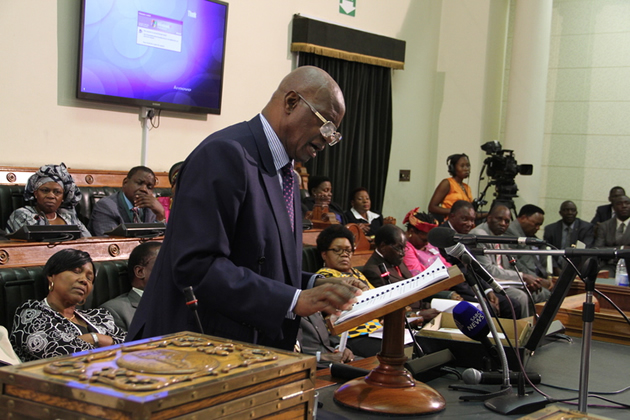Govt lightens tax burden


Finance and Economic Development Minister Patrick Chinamasa presents the 2015 National Budget in Parliament yesterday
Business Reporter
FINANCE and Economic Development Minister Patrick Chinamasa has increased the salary tax-free threshold from $250 to $300 per month and widened income tax bands to bring relief to taxpayers.
Announcing the 2015 National Budget Statement in Parliament yesterday, Minister Chinamasa said the decision — effective January 1, 2015 — was taken to improve aggregate demand for goods and services.
“In order to raise aggregate demand for goods and services, I propose to review the tax-free threshold from the current $250 to $300, and further widen the tax bands, with effect from 1 January 2015,” he said.
ALSO SEE
Following the widening of tax bands, monthly salaries up to $300 will not be taxed. Salaries from $301 to $1 500 will be taxed at 20 percent, 25 percent for $1 501 to $3 000 and 30 percent for $3 001 to $5 000.
Minister Chinamasa said individuals earning from $5 001 to over $20 000 per month will pay tax rates between 35 percent and 50 percent.
The proposed tax relief measures come against the backdrop of declining consumer demand due to low disposable incomes spawned by tight liquidity and company closures.
However, Minister Chinamasa did not say anything on the tax-free bonus threshold, set at $400 last year, implying the rate remains unchanged.
In line with efforts to lower local prices and make industry competitive, Minister Chinamasa said the Ministry of Industry and Commerce had identified cost drivers contributing the high cost of production and prices.
“Cabinet has approved a wide range of business-friendly recommendations made by the Ministry of Industry and Commerce and aimed at addressing these cost drivers in line with regional trends.”
Minister Chinamasa also announced the decision to extend the six months amnesty, for people who evaded tax payment, from the initial six months Treasury extended in October to a period of 15 months.
“The impact of the economic challenges over the past decade resulted in some taxpayers evading their tax obligations. Government thus granted tax amnesty for a period of six months,” he said. One of the conditions of the amnesty was that the unpaid dues were supposed to be settled within a period of six months.
The Finance Minister said the decision to extend the amnesty followed concerns from taxpayers that the time period within which to settle the tax obligations was inadequate; hence it undermined the effectiveness of the amnesty at a time firms were struggling.
To encourage compliance with payment of tax obligations to mobilise resources for the $4,1 billion budget, Minister Chinamasa said that early payment of taxes will benefit from a 5 percent discount.
Highlights . . .
$4,1 billion Budget unveiled mostly unchanged from last year, but will incur a small deficit of $15 million.
Employment costs to chew up 82 percent while the balance will go to capital expenditure and operations.
Economy projected to expand 3,2 percent in 2015, Inflation to remain below one percent.
Agric prospects for 2014-5 remain positive, $253 million mobilised under the Presidential Inputs Scheme.
$200 million boost for struggling firms.
Tax on unprocessed platinum suspended.
Mineral output to grow 3.1 percent in 2015.
Manufacturing sector to grow 1,7 percent in 2015.
Debt to close at $8,3 billion by December 2014.
New rules for indigenisation.
Minimum capital requirements for insurance companies to be reviewed upwards.
Tourism sector to grow 4.7 percent in 2015.
Interbank Facility to be operational from December 2014.
Current account to further deteriorate, capital account to remain in surplus and FDI to register 69 percent growth.







Comments